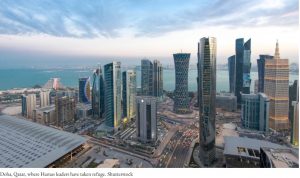With Trump’s Executive Order, America Has Allied Itself Not with a Partner for Peace, but an Agent for Instability

President Donald Trump’s September 29, 2025, executive order granting Qatar a NATO-style security guarantee is a strategic blunder built on a foundation of fantasy. The order cites the need to protect Qatar from “continuing threats … posed by foreign aggression.” The question is, what threats? What foreign aggression? The State of Qatar is not a victim in the Middle East; it is a source of the instability that plagues the region. The only “foreign aggression” it should fear is the consequence of its own policies.
The Qatari regime has perfected a cynical and dangerous double game.
For decades, the Qatari regime has perfected a cynical and dangerous double game. It hosts the Al Udeid Air Base, giving it the veneer of being a Western ally while it serves as the world’s most significant financier of the Muslim Brotherhood and its terrorist offshoots. The leaders of Hamas, the perpetrators of the October 7, 2023, massacre, do not hide in caves; they hold press conferences from the lobbies of luxurious Doha hotels, their lifestyles and operations underwritten by the same monarchy the United States now swears to protect. This security pact creates the possibility that an Israeli operation to eliminate a Hamas leader in Doha could be officially regarded as “a threat to the peace and security of the United States.” It is a strategic absurdity of the highest order.
Qatar’s aggression is not limited to terror financing. It has waged a patient, multibillion-dollar war of ideas against the West, using its state-funded narrative machine Al Jazeera to spread antisemitic and anti-American propaganda. It has poured billions of dollars into universities in a campaign of ideological subversion, poisoning the well of our public discourse and creating the campus environment where genocidal chants now become “social justice.”
This executive order cannot stand. The path to its revocation requires a new, coordinated campaign, a coalition of the aggrieved led by the victims of Qatari statecraft. This fight must be waged not with arms, but with the potent, democratic weapons of truth, law, and political pressure.
First, the broad coalition of nations that have suffered from Qatar’s destabilizing influence—including Israel, Saudi Arabia, the United Arab Emirates, Bahrain, and Egypt—must form a diplomatic front. They must jointly lobby the U.S. Congress, presenting a case, backed by intelligence, that this executive order does not enhance regional stability but, rather, shields the primary source of its decay.
Jerusalem should immediately take a series of nonviolent, democratic steps to expose and counter the Qatari regime.
Second, Israel, as the primary target of Qatar’s Hamas proxies, must move from a defensive posture to a proactive, political offense. The time for quiet diplomacy is over. Jerusalem should immediately take a series of nonviolent, democratic steps to expose and counter the Qatari regime. It should, for example, formally recognize and host an office for the Qatari opposition. Granting a platform and a voice to the dissidents and democrats silenced by the monarchy would be a powerful act of political jujitsu, highlighting the hypocrisy of a regime that funds Islamist movements abroad while crushing dissent at home.
Furthermore, Israel should launch a global public information campaign, complete with the names, dates, and financial records, that meticulously documents the flow of Qatari funds to the terror groups that have murdered its citizens. This is not about winning a public relations battle; it is about providing the evidence necessary for legal action against Qatari assets and for Congress to act.
Finally, the non-state victims of Qatar’s policies must be empowered. The families of those murdered by Hamas, the journalists imprisoned by Qatar’s allies, the moderate Muslims silenced by its extremist proxies—their stories are powerful weapons. Congress and courts must give them a platform to make the case that America has allied itself not with a partner for peace, but an agent for instability.
This executive order is a sorrowful chapter in American foreign policy, the result of a successful and cynical influence campaign. But it is not the final chapter.
Gregg Roman is the executive director of the Middle East Forum, previously directing the Community Relations Council of the Jewish Federation of Greater Pittsburgh. In 2014, the Jewish Telegraphic Agency named him one of the “ten most inspiring global Jewish leaders,” and he previously served as the political advisor to the deputy foreign minister of Israel and worked for the Israeli Ministry of Defense. A frequent speaker on Middle East affairs, Mr. Roman appears on international news channels such as Fox News, i24NEWS, Al-Jazeera, BBC World News, and Israel’s Channels 12 and 13. He studied national security and political communications at American University and the Interdisciplinary Center in Herzliya, and has contributed to The Hill, Newsweek, the Los Angeles Times, the Miami Herald, and the Jerusalem Post.
see the full article here:
Granting Qatar a Security Guarantee Is a Strategic Mistake – Middle East Forum
